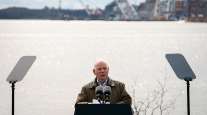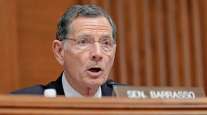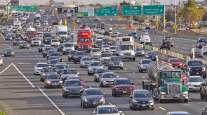Senior Reporter
Trump Urges Congress to Pass $1 Trillion Infrastructure Bill

This story appears in the March 6 print edition of Transport Topics.
WASHINGTON — Addressing Congress for the first time, President Trump was short on specifics when he called for passage of a $1 trillion infrastructure investment plan that he suggested would modernize the country’s transportation network.
“To launch our national rebuilding, I will be asking the Congress to approve legislation that produces a $1 trillion investment in the infrastructure of the United States, financed through both public and private capital, creating millions of new jobs,” Trump said during his Feb. 28 prime-time address, delivered a day after he had promised governors meeting at the White House that he would announce a “big” infrastructure plan.
During the congressional address, Trump stressed a desire for relying on American-made products and local labor for big-ticket infrastructure projects.
His plan’s specifics are expected to be included in his administration’s budget proposal due out this month. During his election campaign, Trump had promised to modernize the country’s “third-world” airports, fix potholes and modernize transit and freight corridors. His prime-time address lacked his penchant for touting the potential benefits of private capital, as well as the pessimistic statements of the campaign trail.
In a document co-written by Commerce Secretary Wilbur Ross, the Trump campaign indicated it would push a 10-year, $1 trillion investment plan that would provide tax credits for investors.
On Capitol Hill, Trump’s transportation proposal has yet to take off. Rep. Bill Shuster (R-Pa.) and Sen. John Barrasso (R-Wyo.), chairmen of the House and Senate transportation committees, respectively, quickly praised Trump’s call-to-action on infrastructure. Yet neither one presented a timeline suggesting when they would take up a measure that would reflect Trump’s vision.
Shuster and Barrasso spoke briefly at a conference of state transportation directors in Washington on March 1. When reporters asked about the timing for debating an infrastructure bill, Shuster said simply: “I’m not interested in 2018.”
Senior Democrats on transportation panels say they remain skeptical of Trump’s $1 trillion infrastructure plan.
“We need a big push from the White House, otherwise the [Republican] leadership would say, ‘Nah, ah, we’re not going there,’?” Rep. Peter DeFazio (D-Ore.), ranking member of the House transportation panel, told reporters at the same conference, hosted by the American Association of State Highway and Transportation Officials.
“At the end of the day, there’s an old saying we have in my state, ‘People may not believe what you say. They will believe what you do,’?” said Sen. Tom Carper of Delaware, ranking Democrat on the Environment and Public Works Committee.
A day before Trump’s speech, Senate Minority Leader Charles Schumer (D-N.Y.) had called the infrastructure funding pitch a “non-starter.”
“If it’s tax breaks, we’re not going to be for it,” Schumer said at a National Press Club event with House Minor- ity Leader Nancy Pelosi (D-Calif.) via a webcast. “It won’t build things in large places, large parts of America, particularly rural America.”
In January, Democrats unveiled a $1 trillion transportation funding blueprint not backed primarily by private capital. Like Trump’s message to Congress, the Democrats’ blueprint did not specify funding parameters.
Meanwhile, freight industry stakeholders continue to urge for the adoption of a long-term highway funding plan.
American Trucking Associations President Chris Spear said his group is ready to help formulate a sustainable infrastructure funding system.
“ATA was pleased to hear President Trump again sound the call to address our nation’s need to improve our transportation infrastructure. Trucks move 70% of our nation’s goods — more than half of our GDP — on a system of highways and bridges that is now on life support,” Spear said.
Norma Jean Mattei, president of the American Society of Civil Engineers, added, “The time to invest in our nation’s infrastructure is now, to create economic opportunity, enhance our quality of life and save Americans money in the long run. The president spoke of the success of the interstate highway system, which was thanks to public investment. We have that opportunity again.”
“When it comes to infrastructure, strategic focus should be the key,” said Pete Ruane, CEO of the American Road and Transportation Builders Association. “The biggest return on investment would be found by modernizing America’s economic expressway — the interstate system and its connections to the nation’s major ports, inland waterways, rail hubs, airports and pipelines.”




